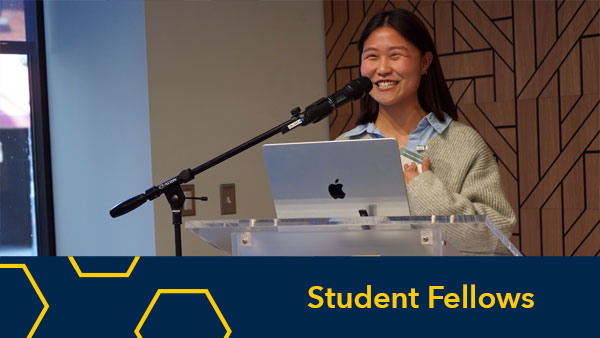Experts from around U.S. explore building diverse campuses, DEI initiatives in light of Supreme Court decision to ban affirmative action in admissions
Sean Corp, Content Strategist
When the Supreme Court ruled race-conscious admissions practices violated the Constitution and thus ended affirmative action in admissions among higher education institutions, it was unclear what kind of impact this would have on campuses throughout the U.S.
The Affirmative Action in Higher Education Teach-Out details the history of affirmative action in college admissions and presents case studies on state-level bans in California and Michigan. It invites experts to discuss how schools, including the University of Michigan, navigated race-neutral admissions practices while striving for diverse campus populations and DEI initiatives.
Experts featured in the Teach-Out include a broad range of faculty, admissions, and student voices from the University of Michigan and contributions from experts at Princeton University, Georgetown University, and Columbia Law School.
The Teach-Out also explores the potential impact of this ruling on future DEI efforts, school applicant pools, recruiting students facing socioeconomic disadvantages, and legacy admissions. There is also a focus on DEI strategies used by higher education institutions and how campuses can increase diversity and recruit a broader spectrum of students.
Select experts featured in the Teach-Out will also participate in “Building an Inclusive Community: Lessons for a Post-Affirmative Action Era,” a live online Q&A discussion on Sept. 25 at 1 p.m. ET. DEI experts will highlight their experiences working toward building diverse student, faculty, and staff populations and leading DEI efforts. This free online event requires registration but does not require enrolling in the Teach-Out.
“I think it is important that all administrators take into account the way that we are building community without regard to what policies say we can and cannot do,” says Kyra Shahid, director of the Trotter Multicultural Center at U-M. “Although, if I am being fully transparent, when you can’t consider race it is hard to intentionally disrupt those patterns of historic disenfranchisement.”
Michael Bastedo, a professor of education and the associate dean of research at the Marsal Family School of Education at U-M, is more encouraged about the flexibility provided to institutions than what many predicted before the release of the Supreme Court’s decision.
“Schools have more room to maneuver in this court decision than I believe they thought they had with Prop 2 (in Michigan) and Prop 209 (in California),” Bastedo says. “Mainly, that the court says you can provide a benefit to students who have overcome discrimination or who have been inspired to achieve by their cultural or racial background.”
The Teach-Out is free to enroll in and is now available on Michigan Online.
Featured Experts in the Teach-Out
Michael Bastedo, professor of education and the associate dean of research and graduate studies at the Marsal Family School of Education at University of Michigan, discusses the current landscape in college admissions practices.
Zachary Bleemer, assistant professor of economics at Princeton University who researches labor and the economics of higher education, discusses race-neutral admissions policies and their impact on enrollment trends and economic outcomes for certain minoritized groups.
Brooklyn Blevins, speaker for the Black Student Union at University of Michigan, shares her perspective on affirmative action as a current U-M student and the challenges some students face on college campuses today.
Aele Brumfield, vice provost for enrollment management at University of Michigan, discusses race-neutral admissions and recruiting initiatives, the difficulty of increasing diversity with race-neutral policies and how Michigan’s Proposal 2, which banned affirmative action admissions policies in Michigan in 2006, disproportionately impacted marginalized groups.
Ryan Henyard, director of faculty and education initiatives at the Association of American Medical Colleges and U-M graduate, discusses his personal experience as a Black student before and after Michigan’s ban on affirmative action policies.
Richard D. Kahlenberg, non-resident scholar at Georgetown University and a prominent advocate for class-based affirmative action in higher education, discusses how shifting focus to admitting students based on socioeconomic disadvantage can help institutions increase diversity among class, race, and gender on college campuses.
Maya R. Kobersy, associate general counsel at University of Michigan, discusses legacy admissions and where it stands in the legal landscape.
Blaire Moody Rideout, director of undergraduate admissions at the Stephen M. Ross School of Business, discusses the admissions practices at Michigan Ross.
Kyra Shahid, director of the Trotter Multicultural Center at University of Michigan, discusses the importance of DEI efforts on college campuses, how the Supreme Court ruling could impact those efforts, and what participants in the Teach-Out can do to support diverse, equitable and inclusive educational opportunities for all.
Susan P. Sturm, professor of law at Columbia Law School, details why the Supreme Court ruling is important for education in America and how to bring people together on a potentially divisive topic.
Katrina Wade-Colden, associate vice provost and deputy chief diversity officer at University of Michigan, on the work and challenges related to creating a diverse campus, fostering belonging and creating DEI initiatives at U-M.


